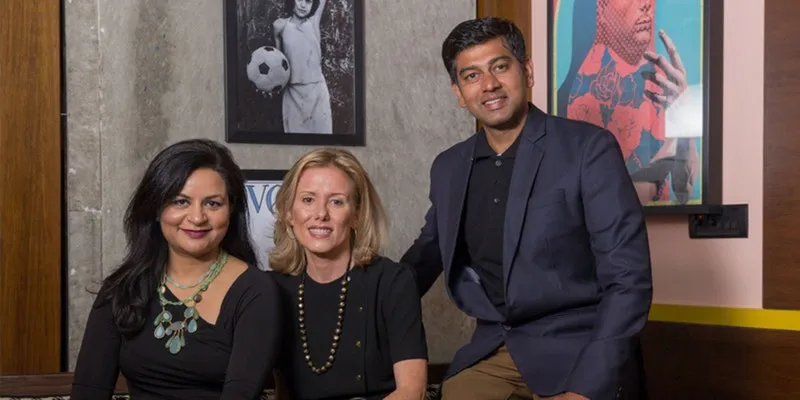[The Turning Point] How three colleagues identified the friction in the way India used EMI and solved it with ZestMoney
Turning Point is a series of short articles that focusses on the moment when an entrepreneur hit upon their winning idea. Today, we look at Bengaluru-based ZestMoney that follows the mantra 'EMI for everyone'
Three years ago, when fintech only had payments in its spectrum, a large population of the country was yet to discover and use the EMI system to its fullest. Certain products were accessible only to those who had a high credit score or owned a credit card or had a large salary. The only option for most people to secure funds for expensive purchases was to borrow from friends and family.
Co-founders of ZestMoney Priya Sharma (CFO), Lizzie Chapman (CEO), and Ashish Anantharaman (CTO) noticed this friction in the online transactions system in India. They were then colleagues at Wonga, a UK-based finance company. Lizzie was the India head, working out of Mumbai, Priya was heading corporate development from London, and Ashish was the head of software development.

Priya Sharma, Lizzie Chapman and Ashish Anantharaman.
Finding scope to provide affordable, digital, small-ticket consumer credit to a market as big as India, the trio found the opportunity exciting and decided to start ZestMoney.
Speaking with YourStory, Lizzie says,
“We don't believe that people need to go to banks and take out heavy loans to finance their purchases. These can be financed instantly, at the checkout, using technology and data intelligence. This is exactly what we have envisioned to build ZestMoney.”
She refers to the RBI data, which shows there are no less than 23 million credit cards issued in India, but the number of credit card-holders in India is not more than 10 million. Lizzie points out that it is a very miniscule number in a population of 1.3 billion. This is because most of those who can get a credit card tend to own more than one (from different banks).
After looking at the data, the team understood that a significant chunk of its user growth was coming from Tier II and III cities, contrary to industry trends.
Lizzie said, “We started focussing more on non-metro cities and reached out to many merchants relevant for the consumer base. Today, cities such as Patna, Lucknow, Indore, Bhopal, Jaipur, and Ahmedabad are some of our top-performing cities."
The technology startup facilitates real-time credit decisions based on alternative data sources, thereby enabling lenders to reach a wider market in a technology-driven and efficient manner.
ZestMoney was seed-funded with $2 million by Ribbit Capital and Mumbai-based Omdiyar Network. In August 2018, the startup raised $13.4 million in its Series A2 funding, led by smartphone manufacturer Xiaomi. Prior to that, PayU led the company's Series A investment of $6.5 million in 2016.
As part of its Series B round, ZestMoney raised $20 million, led by global fintech investor Quona Capital, Australian fintech investor Reinventure, Ribbit Capital, Omidyar Network, and PayU. The new funds were reported to address the growing demand of EMI financing in India and the company's expansion.
(Edited by Athirupa Geetha Manichandar)


![[The Turning Point] How three colleagues identified the friction in the way India used EMI and solved it with ZestMoney](https://images.yourstory.com/cs/2/730b50702d6c11e9aa979329348d4c3e/Image42m21576236756411jpg?mode=crop&crop=faces&ar=2%3A1&format=auto&w=1920&q=75)
![[The Turning Point] Why this CA decided to leave a cushy job in London to launch fintech startup Lendingkart](https://images.yourstory.com/cs/wordpress/2017/08/DSC_0836.jpg?fm=png&auto=format&h=100&w=100&crop=entropy&fit=crop)





